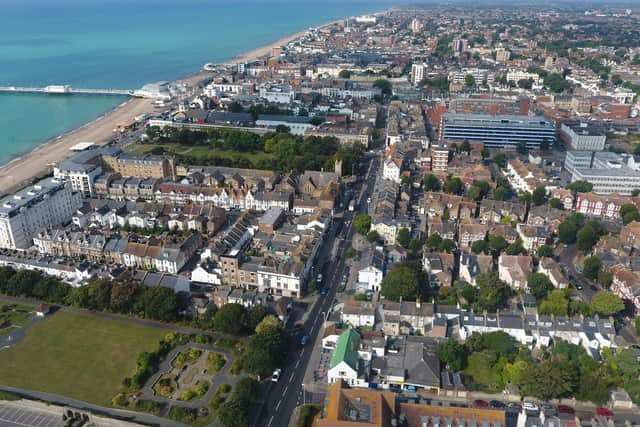Worthing councillors clash over Covid-19 strategy in extraordinary meeting
and live on Freeview channel 276
Opposition councillors accused the Tory leadership of not having, or at least failing to communicate, a strategy to manage a second wave of the virus and suppressing scrutiny from outside the leadership team.
Council leader Dan Humphreys accused the dissenters of ‘waffle’ and lacking tangible arguments, while defending the council’s communications strategy.
Advertisement
Hide AdAdvertisement
Hide AdThe overall futility of the meeting, held just one week before a scheduled assembly of the full council, was summed up by deputy leader Kevin Jenkins who told opposition leader Beccy Cooper: “We will agree to disagree.”


Council accused of ‘going through the motions’
Last night’s extraordinary meeting followed a request by Liberal Democrat Martin McCabe, backed by other opposition councillors, submitted in mid-September.
Mr McCabe’s submission said it was ‘crucial’ councillors heard leader Dan Humphreys’ strategy for the next stage of the pandemic.
But opposition councillors, including Labour leader Beccy Cooper, were incensed by a report submitted by ‘unelected officers’ rather than Mr Humphreys himself.
Advertisement
Hide AdAdvertisement
Hide AdSpeaking last night, Mrs Cooper said: “We hold you solely responsible for the strategic direction of this council. We grow increasingly concerned when we have non-elected officers submitting reports. Where is the strategic direction?
“The public have elected us, they have not elected the officers that are working very hard. For good or ill, they have elected you as members of this council and we expect to be able to look at your strategic direction. It is increasingly difficult to do that if you are hiding behind officers’ reports.
“It’s not unreasonable to expect the leader to submit a report. We feel strategic direction should come from the top. If it’s not coming from the top, where is it coming from?”
Labour’s Carl Walker poured scorn on the council’s ‘And Then...’ release – a document setting out plans for the town’s economic recovery post-lockdown – and said it did nothing to address the threat of a second wave.
Advertisement
Hide AdAdvertisement
Hide AdHe said the document read as self-congratulation by the council, which he said was ‘slapping its own back so hard it couldn’t hear the train coming down the tracks’.
Mr Walker called for clear policy on how a second wave would be addressed – a point supported by Mr McCabe who accused the council of performing ‘empty rituals’.
“This council goes through the motions and carries out empty, futile rituals and there’s no meaning because there’s no questions, no real scrutiny,” he said.
“We wait for the policy, democracy and leadership to arrive. It never comes because no-one is ever able to question or scrutinise. This is a council going through the motions.”
Advertisement
Hide AdAdvertisement
Hide AdA motion raised for Dan Humphreys to submit a report on the council’s strategy in time for the next council meeting was rejected along party lines.
Council hits back against ‘waffle’
Mr Humphreys rejected there was a need for an extraordinary meeting when it was first suggested, saying that despite outbreak control being primarily the responsibility of the county council, the borough council was meeting regularly enough and there was no precedent of other local authorities calling extraordinary meetings.
Responding to a public question, he said arranging the meeting had taken up 32 hours of council officers’ time at a cost of around £1,900.
He started the meeting cynical as to whether it would have any tangible impact on the lives of Worthing’s residents and, by the end, was even more disillusioned.
“I’ve heard absolutely nothing but waffle,” he said.
Advertisement
Hide AdAdvertisement
Hide Ad“I’ve heard ‘strategic leadership’ being banded around, ‘residents being let down’, I haven’t heard a single, minute, tangible example of anything this council has done wrong in this time.
“I haven’t heard one councillor point to one single thing that would have disadvantaged a single member of the community in Worthing. They haven’t even tried.”
He said the meeting and speeches from the opposition had ‘achieved nothing’ and that it had been arranged to ‘get column inches for other members’.
“I’m proud of what the council has done over the last six months and proud this council is ready to help this community over the next six months,” he said, and pointed to the speed at which homeless people had been housed and the efficiency with which council workers moved to working from home.
Advertisement
Hide AdAdvertisement
Hide AdMr Humphreys is due to submit a report to the full council next week, as is the protocol for each full council meeting, but it was not confirmed how much Covid-19 planning would feature, if at all.
Evolving strategy to prevent and manage cases
Councillors voted to note a report submitted by officers detailing the evolving strategy to prevent and manage Covid-19 cases.
With West Sussex County Council as the lead authority for public health, much of it focused on supporting the council’s Local Outbreak Control Plan (LOCP).
It said Adur and Worthing Councils’ primary role was supporting public health bodies and ‘ensuring our communities, businesses and places have good and effective control measures in place and prevention activity underway’.
Advertisement
Hide AdAdvertisement
Hide AdMain tasks included disseminating information to help control the spread and supporting vulnerable people.
The councils have responsibility for distributing payments of £500 to low income people forced to self-isolate and an online service would be set up to coordinate that, the report said.
A number of local community groups had also been set up to assist with community engagement and communication.
“Adur and Worthing Councils will be receiving £75,000 for each council to assist with the efforts required for outbreak planning, the majority of which will be used to support the capacity of environmental health officers to respond to outbreaks locally,” the report said.